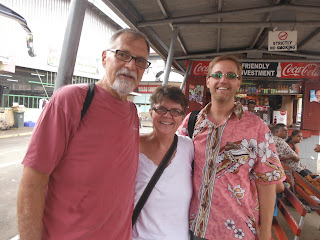We started with a visit to Dave Crowley, a Peace Corps volunteer from Washington DC, now living in Sigatoka. Archeological excavations in the Sigatoka Sand dunes have uncovered pottery more than 2600 years old and one of the largest burial sites in the Pacific. The sand dunes have been forming over millions of years as sediments brought down by the Sigatoka River are washed ashore by the surf and blown into dunes by the prevailing winds. Dave took us to Nakabuta, a small pottery village where he lived for 14 months. We were treated to a meke, tralala, garland wreathes, sevusevu and a pottery demonstration. It was fabulous!
Mary Griffith, Dave Crowley and Joe in Sigatoka..
 |
| Water Rugby |
Joe is drinking kava....and a fan dance meke....
Dave's bure where he lived.
Pottery has a 3000 year history in Fiji, thought to have first been brought by the Lapita people. The pots are beaten into shape with wooden paddles of various shapes and sizes. Coil and slab-building techniques are also used. Once, dried, pots are fired outdoors in an open blaze on coconut husks, and are often sealed with resin varnish taken from the dakau tree.
None of the pots are made using machines or wheels. Instead, local sand and clay is collected from the river and mixed together using the heel of the foot and the pots are formed with the hands. These are sun dried and fired in open fires. The resin from the trees are the glazes. There is no second firing. All the women of the village participate in this art. I am interested in learning more about pottery in Fiji and will visit another pottery village and keep you posted... Nasilai village is home to the well-known potter, Taraivini Wati. Pottery is a major source of income for this village. When a baby girl is born in the village, a lump of clay is placed on her forehead. It is believed she will then automatically know how to carry on the pottery making tradition! Can't wait to visit in May.
Our next adventure was to Beqa Island. The island is about 7km in diameter. It is known as a diving resort to view sharks and for fire walking. Beqa Lagoon is one of the few places where it is possible to dive with massive barrel-chested bull and tiger sharks without being caged!!!!! We met a lot of great people and were able to snorkel, kayak, eat great food, have complimentary foot massages, hike to a waterfall, learn about Fiji plant medicines, (more about that later!) read, and enjoy a bit of LALA land! We did not get to see fire walking or Sharks!
Our bure....#21
Complimentary foot massage on arrival... We were met with music, garland wreathes, cold drinks and friendly hospitality. Joe doesn't let many people touch his feet!!!!
I love to read and nap in a hammock by the sea.....
There is a large restaurant lounge bure serving fabulous food and a pool on a coconut tree-fringed beach.
Is this LALA land?????
GOOD PEOPLE we met this weekend......
A parade to the soccer field...


MOCE.....














































